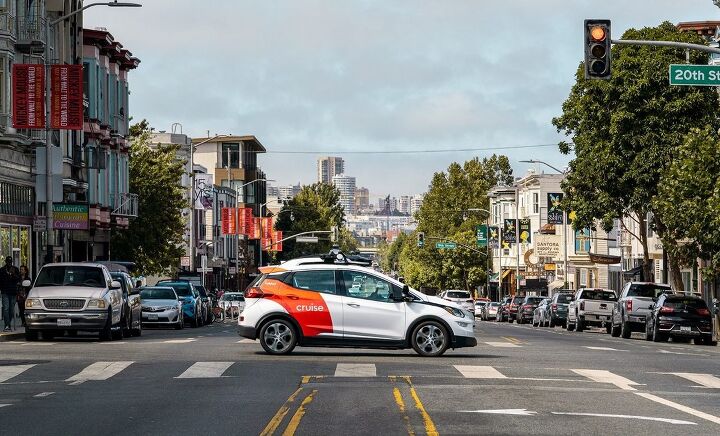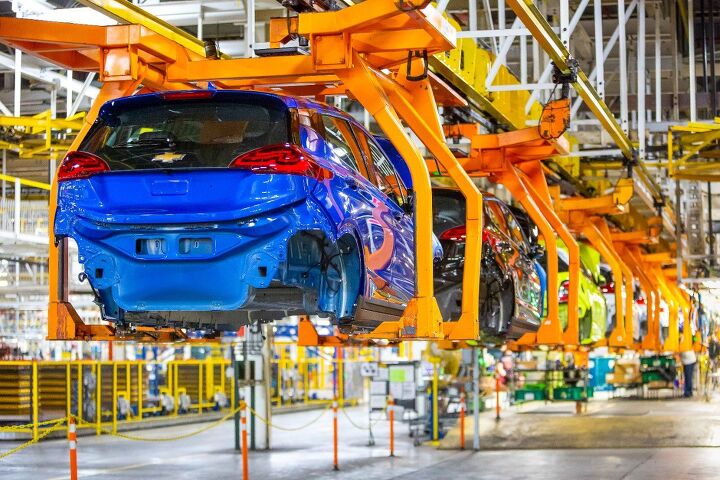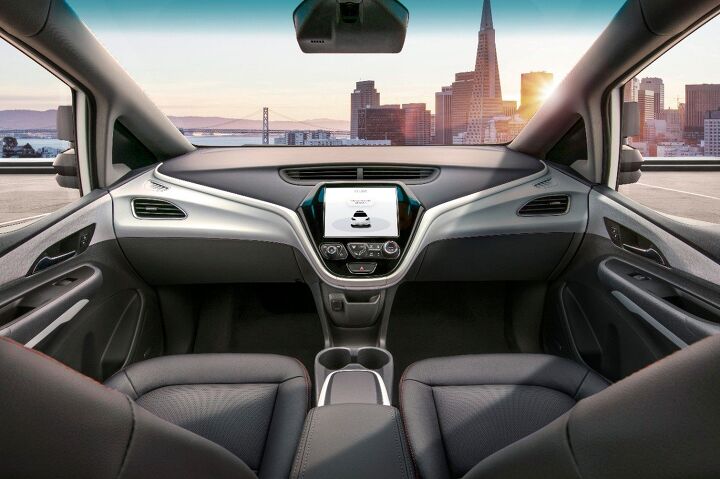#CruiseAV
Cruise to Suspend All Driverless Operations After California Pulled the Plug
Cruise was already in hot water with California authorities after a string of high-profile incidents, and now the company is suspending all operations to regroup and rebuild public trust.
GM's Cruise Asks White House to Dissolve AV Testing Restrictions
General Motors has a long and illustrious history of receiving government favors, with 2021 likely to continue the trend. Having recently seen its request to have federal EV tax credits reset approved by the Senate Finance Committee, GM-owned Cruise is now seeking to double down by asking regulators to scale back restrictions on autonomous vehicle testing. With practically every automaker simultaneously requesting government hookups on a weekly basis, it’s hardly surprising to see this.
What is unique is the rationales given for government help and it’s often the only way to measure their merit. While most claims tend to boil down to “ we need more money,” Cruise wants regulators to get out of the way so the United States can become more competitive against China’s AV programs and is hardly the first company to make such a suggestion.
GM Lays Off Cruise Employees
Cruise, the self-driving arm of General Motors, is cutting roughly 8 percent its full-time staff as coronavirus lockdowns mar the economy and companies walk back development programs. You might have noticed the hype surrounding autonomous cars started dying down even before 2020 became the most miserable year in recent memory.
That made them prime candidates for cost-saving cuts. Health concerns have likewise made autonomous concepts like “robotaxis,” where occupants are confined together in small, self-driving shuttles, far less appetizing. Cruise actually showed off a six-passenger AV it developed and built back in January. Interested in paying to ride face to face with complete strangers?
We didn’t think so.
What's Next for GM's Other EV/AV Plant?
General Motors has tapped its no-longer-slated-for-mothballs Detroit-Hamtramck facility to spawn the automaker’s looming EV tsunami, but it isn’t the only Southeast Michigan plant with a forward-thinking mandate.
Orion Assembly, home to a sparse Chevrolet product lineup, is already building electric and autonomous vehicles. While it’s a much less glamorous operation than what GM has in store for Detroit-Hamtramck, it’s still a significant part of the General’s EV and AV offensive, with growth on the horizon.
GM's First Self-driving Car May Keep Manual Controls
This time last year, we were under the impression that General Motors’ first attempt at an autonomous vehicle would come without pedals, a steering wheel, or any other controls traditionally associated with driving. Cruise Automation, the GM subsidiary tasked with developing the vehicle, seemed confident it could deliver something that didn’t need to rely on human intervention to be truly safe. This promise was reiterated by GM in January of 2018 via a request to produce the car sans controls though federal exemption.
U.S. laws governing what constitutes a safe automobile were written before autonomous vehicles entered development, creating problems. It wasn’t evident to anyone that GM could legally manufacture a vehicle that lacked traditional controls, as existing laws stipulated that all automobiles had to have them. While the Department of Transportation has proven rather lenient on policing AVs in terms of testing, rewriting the Federal Motor Vehicle Safety Standards or providing exemptions was a bridge too far — especially when self-driving tech is new, frequently misunderstood, and backed heavily by corporate interests. The existing guidelines remain unchanged and new legislation pertaining to self-driving vehicles has stalled in Congress.
Apparently sick of waiting, General Motors now appears satisfied to just build AVs with manual controls.
GM's Cruise Sees Another Billion-dollar Investment
General Motors’ self-driving vehicle unit, Cruise, has attracted new investors and an equity infusion of $1.15 billion as it continues work on its commercial fleet of autonomous taxis. The new investment, which effectively brings the operation’s valuation to $19 billion, is primarily fronted by Baltimore-based asset management company T. Rowe Price Associates Inc. and existing partners like SoftBank’s Vision Fund and Honda Motor Co.
“Developing and deploying self-driving vehicles at massive scale is the engineering challenge of our generation,” said Cruise CEO Dan Ammann. “Having deep resources to draw on as we pursue our mission is a critical competitive advantage.”
What Does Ford Look Like As a Mobility Company?
These days, every automaker is in the midst of a metamorphosis, eager to emerge from their chrysalis as a “mobility company.” Even brands that don’t seem bent on completely revolutionizing their business model now use the term in reference to themselves.
Ford, which has positioned itself as a mobility company ever since Mark Fields was steering the ship, is among those pushing the narrative the strongest. Fields may have been fired for having a lofty, tech-focused vision that couldn’t charm investors, but much of it carried over to Jim Hackett’s tenure as CEO. Ford desperately wants to be seen as a cutting-edge nameplate.
However, the assumption among industry experts is that it’s lagging behind General Motors in terms of autonomous driving, electrification, and the ability to tap into alternative revenue streams. We sometimes wonder how accurate those assumptions are.
More Evidence That Self-driving Cars Are on a Road to Nowhere
We’ve been critical that self-driving systems are, ahem, “oversold” by automakers and tech firms hoping to boost their stock valuations. That doesn’t mean autonomous vehicles won’t happen, just that the timeline is probably a lot longer than the public has been led to believe. Still, it makes sense to pursue AVs. The first company to achieve legitimate self-driving will blow the hinges off a door leading to an array of new business opportunities.
General Motors, long considered a frontrunner in the autonomous race, is apparently in desperate need of a second wind. Its Cruise self-driving unit is said to be woefully behind in its attempt to bring an autonomous vehicle to the commercial market by 2019. Some GM staffers have confessed that the current system isn’t even capable of identifying whether objects are in motion or not — which seems like an important distinction for a computer-controlled automobile to be able to make.
GM Claims It Will Start Manufacturing Autonomous Cars Next Year
General Motors has announced it will begin manufacturing autonomous vehicles by 2019. Since purchasing Cruise Automation in 2016, GM has invested heavily into self-driving cars. However, its Chevrolet Bolt-based Cruise AV has only served as a testbed for the technology. That will change next year when the Orion Township assembly plant in Michigan starts building examples for commercial use.
If so, that would make General Motors the first company to sell an autonomous vehicle. However, it’s not entirely clear if that’s the ultimate goal. Thus far, GM has only said the autos will enter into a “ride-sharing environment” where the vehicles can be managed in a fleet — perhaps something akin to Uber.
Obviously, the analogy is as accurate as it is unfortunate. Uber recently suspended autonomous testing after one of its vehicles fatally struck a pedestrian earlier this week. While GM’s product planning can hardly be faulted for the goings-on at another company, the collision could see the general public wonder if production Cruise AVs are ready to take over the road.
No Pedals, No Wheel: GM Unveils Bolt-based Autonomous Fleet
General Motors has showcased its plan to launch public ride-hailing services by teasing a self-driving vehicle with no manual controls whatsoever. The fleet is said to arrive in 2019, which gives us plenty of time to form an angry mob.
On Thursday, the company announced it had submitted a safety petition to the National Highway Traffic Safety Administration requesting that autonomous Chevrolet Bolts be allowed to operate on public roads without adhering to the Federal Motor Vehicle Safety Standards that pertain to actual driving.
























Recent Comments